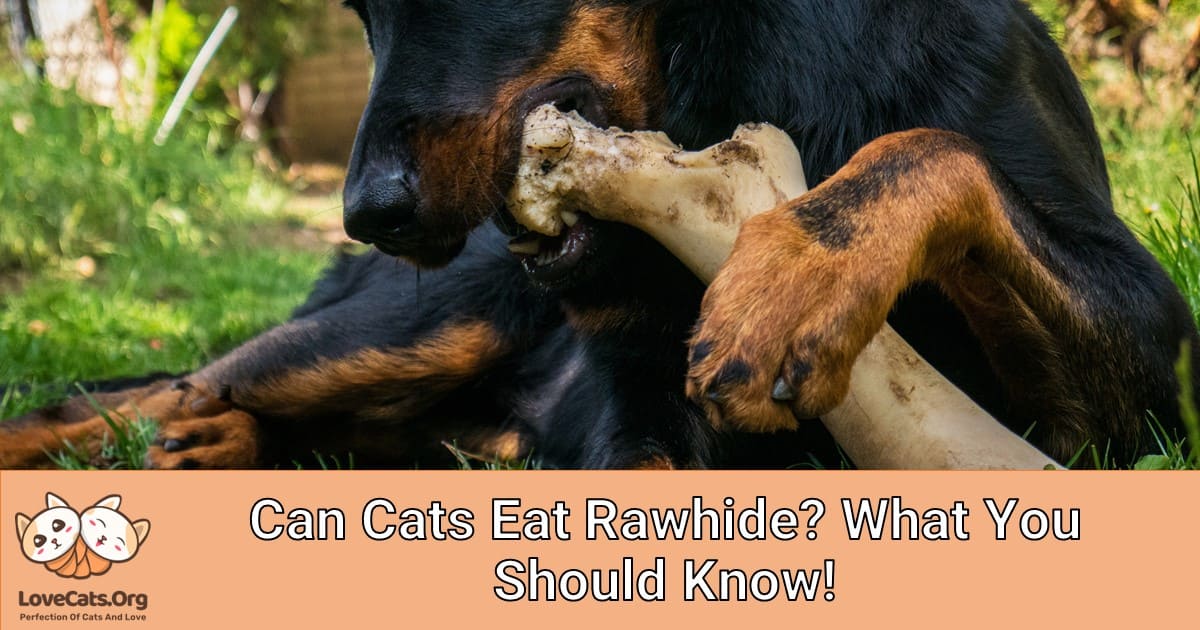In my opinion, if given in moderation as part of an overall balanced diet – yes!
Rawhide has many benefits for cats; it helps keep their teeth clean, provides mental stimulation, and encourages healthy chewing habits.
On the other hand, there are some risks associated with feeding the cat rawhide that you should consider before making any decisions about giving it to your pet.
Cats can eat rawhides safely – provided certain precautions are taken.
Such as avoiding those treated with chemicals or preservatives, which could cause digestive upset or toxicity in felines.
Can Cats Eat Rawhide Chews?
Cats can eat rawhide chews, but it is not recommended.
Rawhide chews are made from animal hides and contain chemicals that may harm cats if ingested in large amounts.
They also pose a choking hazard due to their size and shape.
If your cat does consume some of the chew, watch for signs of gastrointestinal distress such as vomiting or diarrhea.
Contact your veterinarian immediately if these symptoms occur.
Here are some important facts about feeding rawhides:
- Cats should never have access to unsupervised chewing on any hide product (rawhide included).
- Always supervise when giving treats like this so you can take away pieces before they become too small for safe consumption by the kitty!
- Avoid flavored varieties – Since artificial flavors could cause an upset stomach or other digestive issues in felines who ingest them regularly over time – stick with plain ones instead!
- Consider alternative options such as dental-friendly toys designed specifically for cats that provide similar benefits without potential risks associated with consuming parts/pieces of the toy (e.g., rubber balls filled with catnip!).
Is Rawhide Safe For Cats?
Rawhide is a popular chew toy for cats, but it’s important to know if rawhide is safe.
The answer depends on the type of rawhide and how your cat uses it.
Generally, most rawhides are not recommended as they can be difficult to digest or cause choking hazards when chewed into small pieces.
However, some safer alternatives may work better for cats:
- Soft Rawhides – These have been treated with chemicals, so they’re softer than regular ones; however, these still pose risks since cats could choke on them if swallowed whole or in large chunks.
- Vegetable-Based Chews – Made from sweet potatoes and carrots, these provide an alternative source of nutrition while satisfying their chewing needs without posing any health risks associated with traditional hide products, such as indigestion or blockages due to swallowing too much at once!
- Catnip Toys – Cats love playing with toys filled with catnip which provides stimulation without being dangerous should kitty swallow part of the toy by accident (as long as you keep an eye out!).
Overall, it really isn’t advisable because even though soft varieties exist now
they’re still potentially hazardous depending upon how quickly/aggressively your pet decides to chomp down on them!
Therefore always opt for vegetable-based chews and other non-edible items instead whenever possible.
Why Isn’t Rawhide Safe For Cats?
Rawhide is not safe for cats.
It can cause choking, blockages, and other health problems in felines.
Here are some reasons why:
- Rawhide contains chemicals that may be toxic to cats;
- Cats lack the enzymes needed to digest rawhide properly;
- The texture of rawhide makes it difficult for a cat’s digestive system to break down, leading to potential intestinal obstruction or even death if ingested;
- If swallowed whole, pieces of rawhide can get stuck in their throat or stomach, causing pain, discomfort, and possible infection from bacteria on the chew toy.
- Additionally, sharp edges could cut into your pet’s mouth or esophagus when chewed too vigorously!
- Cats have an instinctive urge towards chewing, so they will likely try eating any material presented before them – including potentially dangerous items like plastic bags and rubber bands. So providing something safer, such as dental treats specifically designed with feline needs in mind, would be much more beneficial than giving them access to anything made of leather/rawhides!
Can Cats Eat Dog Treats?
No, cats should not eat dog treats.
Dog treats are formulated for the nutritional needs of dogs and may contain ingredients that can harm cats.
For example, some dog treat recipes include garlic or onion powder which can cause anemia in felines if ingested over a long period.
Other common ingredients, such as chocolate and xylitol (a sugar substitute), are toxic to both species!
Additionally, many store-bought brands use artificial colors/flavors that could upset your cat’s stomach.
It is best to stick with food specifically designed for feline consumption – here’s what you need:
- High-quality protein sources like chicken and fish
- Essential fatty acids from oils like salmon oil and flaxseed oil
- Vitamins A and E plus taurine – important nutrients found naturally in meat products.
In conclusion, it is safest for cats only consume foods made especially for them!
Can Cats Eat Bully Sticks?
Yes, cats can eat bully sticks!
Bully sticks are a great source of protein for your cat.
They’re made from 100% natural beef muscle and contain no artificial ingredients or preservatives.
Cats love these treats’ taste and texture, making them an ideal snack for felines who need something to chew on between meals.
Here’s what you should know about feeding your kitty bully sticks:
- Bully Sticks provide essential vitamins and minerals that help keep cats healthy;
- They’re low-calorie snacks with high levels of Omega 3 fatty acids;
- Cats enjoy chewing on them as they have a unique flavor profile compared to other types of pet treats;
- It is important not to overfeed bullies because too much could lead to digestive issues like vomiting or diarrhea due to their high-fat content;
- Lastly, always supervise when giving any treatment, so it doesn’t become a choking hazard if swallowed whole by accident!
Can Cats Eat Dog Bones?
No, cats cannot eat dog bones.
Dog bones are too hard and can splinter when chewed on by a cat; these sharp pieces of bone could cause serious injury to the animal’s mouth or digestive tract.
Additionally, dogs’ diets often contain ingredients that may be toxic for cats, such as garlic powder and onion powder which is why it’s important not to feed them any food intended for your canine companion!
Here are some safe alternatives:
- Cat treats – specially formulated with nutrients essential for feline health.
- Cooked chicken breast – high in protein but low in fat, so perfect if you want something tasty yet healthy
- Canned tuna (in water) – packed full of omega-3 fatty acids, which help keep their coat shiny and soft!
In conclusion, feeding your cat or dog bones might seem like an easy solution.
However, it isn’t recommended due to the potential risks associated with this practice.
Cats should only consume foods specifically designed for felines since they have different nutritional needs than our four-legged friends!
In Summary: Can Cats Eat Rawhide?
In conclusion, cats can eat rawhide, but it is not recommended.
Rawhide may contain chemicals and preservatives that harm your cat’s health.
Additionally, the texture of the rawhide could be a choking hazard for some cats if they first swallow large pieces without chewing them properly.
If you give your cat rawhides treats or toys, ensure they’re made from natural ingredients with no added chemicals or preservatives.
Also, ensure that any chunks given are small enough so there isn’t a risk of choking on them!
Ultimately, avoiding giving your feline friend this treat is best.
Instead, opt for safer alternatives such as kitty-safe chew sticks and dental chews, specifically designed with their safety in mind!


